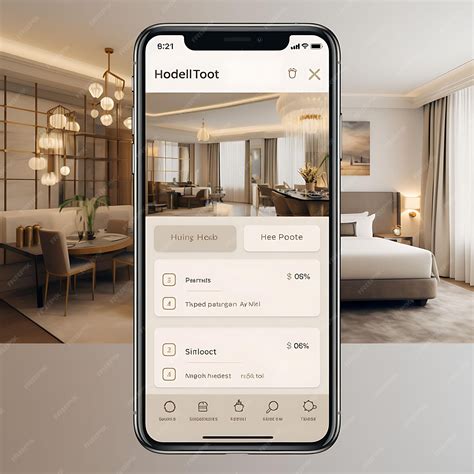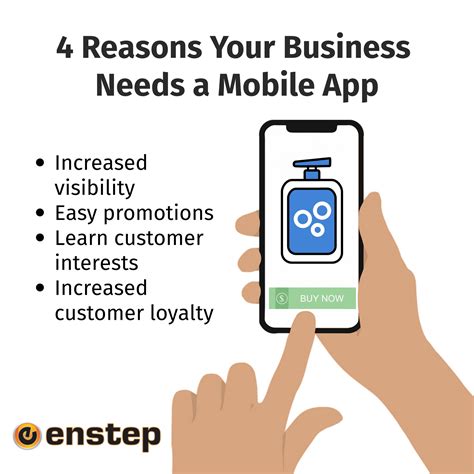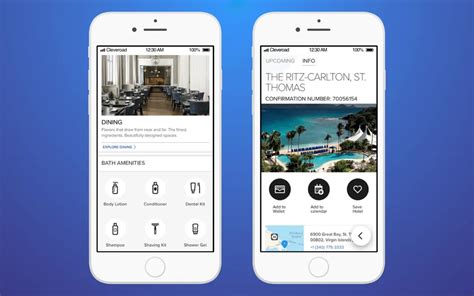Mobile Apps for Hospitality

The hospitality industry has undergone significant transformations in recent years, driven in part by the proliferation of mobile technology. Mobile apps have emerged as a key tool for hotels, restaurants, and other hospitality providers to enhance the guest experience, improve operational efficiency, and drive revenue growth. According to a study by Hotel Management, 71% of hotels consider mobile apps to be an essential part of their guest engagement strategy. In this article, we will explore the role of mobile apps in the hospitality industry, their benefits, and the key features that make them effective.
Enhancing the Guest Experience

Mobile apps can play a crucial role in enhancing the guest experience by providing a personalized and seamless interaction with hospitality providers. For instance, the Marriott International app allows guests to check-in and check-out, access their room key, and even control the lighting and temperature in their room. Additionally, apps can offer guests a range of services, including room service ordering, concierge services, and activity booking. A study by Phocuswright found that 60% of travelers use mobile apps to research and book travel activities, highlighting the importance of mobile apps in the hospitality industry.
Key Features of Hospitality Mobile Apps
Effective hospitality mobile apps typically include a range of key features, such as mobile check-in and check-out, room key access, and personalized recommendations. For example, the Hilton Honors app provides guests with personalized recommendations for local attractions and activities based on their preferences and loyalty program data. Other features may include push notifications for special offers and promotions, integration with loyalty programs, and real-time feedback mechanisms. A study by Forrester found that 70% of travelers prefer to use mobile apps to provide feedback and reviews, highlighting the importance of real-time feedback mechanisms in hospitality mobile apps.
| Feature | Description |
|---|---|
| Mobile Check-in and Check-out | Allows guests to check-in and check-out using their mobile device |
| Room Key Access | Provides guests with digital access to their room key |
| Personalized Recommendations | Offers guests personalized recommendations for local attractions and activities |
| Push Notifications | Sends guests push notifications for special offers and promotions |
| Integration with Loyalty Programs | Allows guests to earn and redeem loyalty points using the app |
| Real-time Feedback Mechanisms | Enables guests to provide feedback and reviews in real-time |

Key Points
- Mobile apps can enhance the guest experience by providing a personalized and seamless interaction with hospitality providers
- Effective hospitality mobile apps typically include features such as mobile check-in and check-out, room key access, and personalized recommendations
- The use of data and analytics is critical in creating a personalized and engaging experience for guests
- Mobile apps can drive revenue growth by providing guests with special offers and promotions, and by enabling them to book activities and services
- The integration of loyalty programs and real-time feedback mechanisms can help to drive loyalty and retention among guests
Driving Operational Efficiency

Mobile apps can also play a crucial role in driving operational efficiency in the hospitality industry. By providing staff with mobile access to key systems and processes, hospitality providers can streamline operations, reduce costs, and improve the overall efficiency of their business. For example, the Accor Hotels app provides staff with mobile access to guest information, room assignments, and other key data, enabling them to respond quickly and effectively to guest needs. Additionally, mobile apps can help to reduce paperwork and administrative tasks, freeing up staff to focus on more critical tasks.
Staff-Facing Mobile Apps
Staff-facing mobile apps can provide a range of benefits, including improved communication and collaboration, streamlined operations, and enhanced customer service. For instance, the Hyatt Hotels app provides staff with real-time access to guest feedback and reviews, enabling them to respond quickly and effectively to guest concerns. Other features may include task management and assignment, inventory management, and reporting and analytics. A study by Hotel Technology Forum found that 80% of hotels consider staff-facing mobile apps to be essential for improving operational efficiency and driving revenue growth.
| Feature | Description |
|---|---|
| Improved Communication and Collaboration | Enables staff to communicate and collaborate more effectively |
| Streamlined Operations | Streamlines operations and reduces administrative tasks |
| Enhanced Customer Service | Enables staff to respond quickly and effectively to guest needs |
| Task Management and Assignment | Enables staff to manage and assign tasks more efficiently |
| Inventory Management | Enables staff to manage inventory levels and reduce waste |
| Reporting and Analytics | Provides staff with real-time access to key data and insights |
Driving Revenue Growth
Mobile apps can also play a crucial role in driving revenue growth in the hospitality industry. By providing guests with a range of services and amenities, hospitality providers can increase average daily rates, drive bookings, and improve overall revenue performance. For example, the Best Western Hotels app offers guests a range of services, including room service ordering, concierge services, and activity booking. Additionally, mobile apps can help to drive revenue growth by providing guests with special offers and promotions, and by enabling them to book activities and services.
Revenue-Driving Features
Effective revenue-driving features of hospitality mobile apps may include mobile booking and payment, special offers and promotions, and activity and service booking. For instance, the InterContinental Hotels Group app provides guests with mobile access to booking and payment, enabling them to book rooms and services on the go. Other features may include loyalty program integration, real-time feedback mechanisms, and personalized recommendations. A study by Phocuswright found that 70% of travelers prefer to use mobile apps to book travel activities and services, highlighting the importance of revenue-driving features in hospitality mobile apps.
| Feature | Description |
|---|---|
| Mobile Booking and Payment | Enables guests to book and pay for rooms and services using their mobile device |
| Special Offers and Promotions | Provides guests with special offers and promotions to drive revenue growth |
| Activity and Service Booking | Enables guests to book activities and services using their mobile device |
| Loyalty Program Integration | Enables guests to earn and redeem loyalty points using the app |
| Real-time Feedback Mechanisms | Enables guests to provide feedback and reviews in real-time |
| Personalized Recommendations | Offers guests personalized recommendations for local attractions and activities |
What are the benefits of using mobile apps in the hospitality industry?
+The benefits of using mobile apps in the hospitality industry include enhanced guest experience, improved operational efficiency, and driven revenue growth.
What features should a hospitality mobile app include?
+A hospitality mobile app should include features such as mobile check-in and check-out, room key access, personalized recommendations, and integration with loyalty programs.
How can mobile apps drive revenue growth in the hospitality industry?
+Mobile apps can drive revenue growth in the hospitality industry by providing guests with special offers and promotions, enabling them to book activities and services, and offering personalized recommendations.
Meta Description: Learn how mobile apps can enhance the guest experience, drive operational efficiency, and drive revenue growth in the hospitality industry. Discover the key features and benefits of hospitality mobile apps and how they can help hospitality providers succeed in a crowded market. (149 characters)



